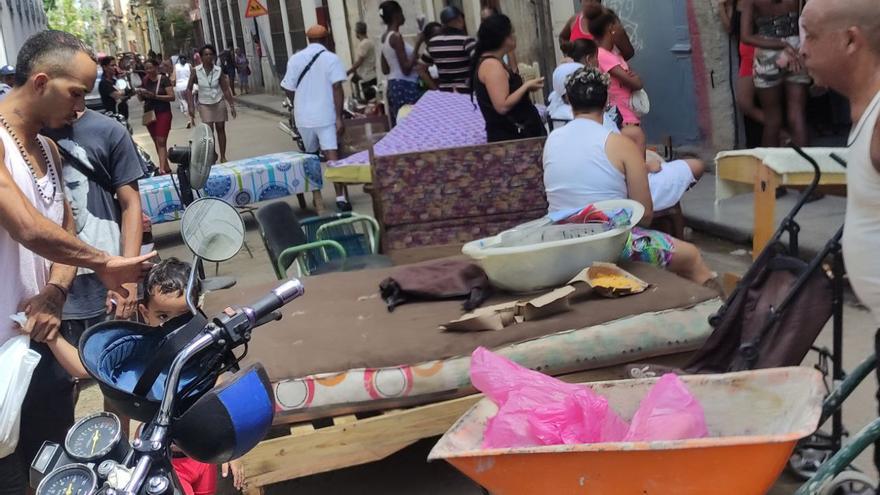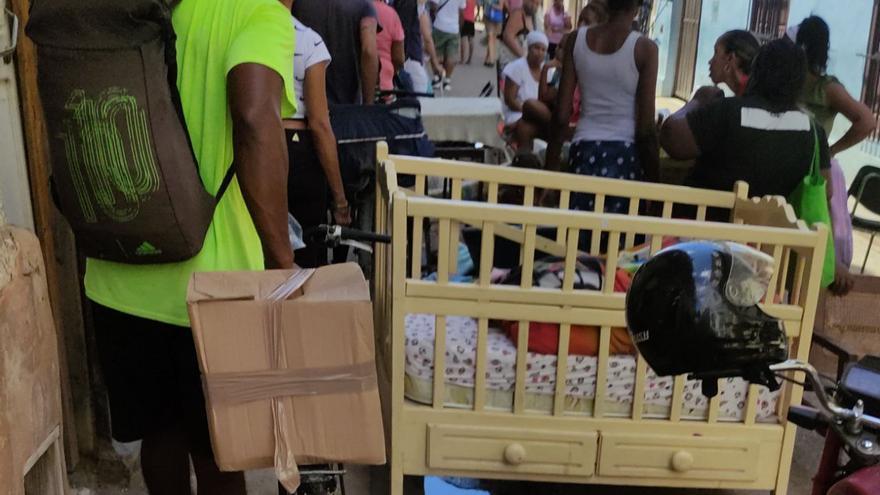
![]() 14ymedio, Juan Izquierdo, Havana, 12 August 2022 — In Cuba, the walls speak as much as the people. Cracks, humidity, bricks, leaks, beams, shreds of clothing, clouds of dust — these are the words of a pained and urgent language: that of the collapsed buildings. They’re not exclusive to Havana, but in Old Havana, punished by salt from the sea air and overpopulation, the boundary between habitable and ruin is more diffuse and matters less.
14ymedio, Juan Izquierdo, Havana, 12 August 2022 — In Cuba, the walls speak as much as the people. Cracks, humidity, bricks, leaks, beams, shreds of clothing, clouds of dust — these are the words of a pained and urgent language: that of the collapsed buildings. They’re not exclusive to Havana, but in Old Havana, punished by salt from the sea air and overpopulation, the boundary between habitable and ruin is more diffuse and matters less.
It’s part of the daily drama that a family, subjected to blackouts and continuous shortages, sees the structure of their house suffer, checks how it trembles during a cyclone and observes how it falls apart due to lack of maintenance.
The roof of a building on Habana Street, between Aguiar and Muralla, in the oldest area of the capital, collapsed several days ago. Not knowing what to do, the inhabitants picked up their belongings and took to the streets in protest.
The faces of mothers, children and the elderly are so desperate that it’s frightening to see. There’s a lot of anger and visceral impotence, because the solution doesn’t depend on personal effort but on the parsimony of the bureaucrats. They tried to appease them with promises: guaranteed food, electricity, materials. But nothing happened.
This Friday they returned to the street again. The junk they have on the street contains their whole life: cribs, mattresses, springs, wash basins, wheelbarrows of bricks, furniture that has been in the family for decades, Soviet devices and Chinese fans, relics of all eras.

The victims of the collapse, disposed to set up their domestic barricade, prevent the passage of vehicles and pedestrians. They want the country to stop and listen to them. “No one will pass through here until this is resolved,” shouts a woman, who only agreed to the request to let an elderly woman clinging to her cane continue.
Local authorities don’t offer solutions or respond to dialogue, but they have already sent the usual gang of State Security agents, motorcyclists with police badges, ex-combatants ready to assert their collection of medals and traffic officers, to divert clueless drivers out of the area.
At the end of the street, a couple of agents try to discredit the screaming women. “They’re being stupid, they’re shameless,” they tell anyone who stops to see the panorama. “They know that they can’t be there and that there are people working to solve the problem. But no: what they want is to put on a show.”
Among those evicted is a woman dressed in white. She’s an initiate in santería and iyawo, but the State Security officers lie to passers-by, telling them that she is a Lady in White.* “No one here cares about whether someone is a saint or a dissident, kid,” someone who passes by answers them. The police are frustrated: the old techniques are of little use.
“Look how the Government helps,” says one woman, pointing to a squalid cardboard box with yellow rice and stale pumpkin, which was distributed in the neighborhood at ten at night. “That’s the food they’re going to help us with,” she says, “I’m supposed to feed my son with that?!”
“We are desperate,” explains another of the victims. “There’s no gas or electricity, and in addition, our kitchens also collapsed. What do we do?”
Those who watch, those who beat people, the bureaucrats, all of them often suffer the same shortages. However, that doesn’t prevent them from complying with the orders of those who live comfortably, without blackouts and fed with imported delicacies.
Meanwhile, a retired old man is preparing to fulfill his “duty” and juggles to interrupt a young man who is filming the scene. No matter where he focuses the camera, the old man harasses him, nudges him and stands in front of the camera, until the young man gets bored and leaves. “We don’t have blood in our veins,” says an angry man who witnesses the scene.
With the barricade and the people shouting, Habana Street is narrowed by sweat and despair. The claim of the evicted, shipwrecked in a country adrift, summarizes the pain of the entire island.
*Translator’s note: An opposition movement founded in 2003 by female relatives of jailed dissidents.
Translated by Regina Anavy
____________
COLLABORATE WITH OUR WORK: The 14ymedio team is committed to practicing serious journalism that reflects Cuba’s reality in all its depth. Thank you for joining us on this long journey. We invite you to continue supporting us by becoming a member of 14ymedio now. Together we can continue transforming journalism in Cuba.
